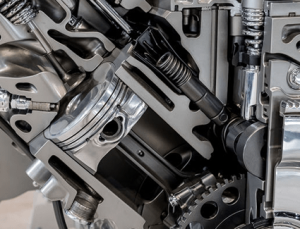Engine knocking is one of the most concerning sounds a driver can hear. That rapid tapping or pinging noise under the hood often signals that something is wrong with your car’s combustion process. If left unresolved, engine knock can lead to severe engine damage, reduced fuel economy, and costly repairs. This article explains what engine knocking is, the common causes behind it, and how to prevent it to keep your vehicle running smoothly.
What Is Engine Knocking?

Engine knocking, also known as detonation or pinging, occurs when fuel in the combustion chamber ignites unevenly. Instead of a smooth burn initiated by the spark plug, parts of the air-fuel mixture combust prematurely or erratically. These uncontrolled mini-explosions collide with the normal flame front, producing a metallic knock.
Why Is Engine Knock Dangerous?
If not addressed, repeated knocking can:
-
Damage pistons, cylinder walls, and bearings
-
Cause engine overheating
-
Reduce engine efficiency and performance
-
Lead to total engine failure in extreme cases
Preventing engine knock early on is crucial for protecting your investment and avoiding unnecessary breakdowns.
Common Causes of Engine Knocking
Let’s explore the major reasons your engine might knock:
| Cause | Description |
|---|---|
| Low-octane fuel | Fuel ignites too early due to lower resistance to pressure |
| Incorrect ignition timing | Spark plug fires too soon or too late |
| Carbon buildup in combustion chamber | Hot spots from deposits cause premature ignition |
| Faulty spark plugs | Poor-quality or worn plugs lead to incomplete combustion |
| Lean air-fuel mixture | Too much air and not enough fuel causes unstable combustion |
| Overheating engine | High temperatures increase risk of spontaneous combustion |
| Bad knock sensor | Fails to detect and adjust engine performance to prevent knock |
Signs Your Engine Might Be Knocking
Stay alert to these common symptoms that suggest knock may be occurring:
-
Ticking or pinging noise from the engine under acceleration
-
Loss of power or sluggish performance
-
Poor fuel economy
-
Illuminated check engine light
-
Higher than normal engine temperature
How to Prevent Engine Knock

Proactive maintenance and good driving habits are your best defense. Here’s how to prevent knocking before it becomes a serious issue:
1. Use the Correct Octane Fuel
-
What to do: Always use the fuel grade recommended in your owner’s manual.
-
Why: Higher octane fuels resist knock better in high-compression engines.
2. Keep the Engine Cool
-
What to do: Ensure your radiator, cooling fans, and thermostat are working properly.
-
Why: An overheating engine increases the risk of detonation.
3. Maintain a Proper Air-Fuel Ratio
-
What to do: Replace oxygen sensors and clean or change your mass airflow sensor.
-
Why: A lean mixture makes combustion more volatile.
4. Clean the Combustion Chamber
-
What to do: Use fuel system cleaners or consider a professional decarbonization service.
-
Why: Deposits in the chamber create hot spots that can trigger knock.
5. Replace Faulty Spark Plugs
-
What to do: Inspect and replace plugs at recommended intervals.
-
Why: Worn plugs can cause misfires and incomplete combustion.
6. Monitor and Fix Ignition Timing
-
What to do: Have a mechanic check the timing, especially on older cars without automatic timing control.
-
Why: Timing that is too advanced or retarded can lead to knock.
7. Check the Knock Sensor
-
What to do: If your car’s ECU isn’t adjusting properly, the sensor may be malfunctioning.
-
Why: A bad sensor won’t detect detonation, allowing damage to occur.
Engine Knock Troubleshooting Table
Here’s a quick troubleshooting guide to help you identify and address the problem:
| Symptom | Possible Cause | Recommended Fix |
|---|---|---|
| Pinging on acceleration | Low-octane fuel | Switch to higher-octane fuel |
| Ticking noise at idle | Faulty spark plugs | Replace spark plugs and check gap |
| Sudden loss of power | Lean air-fuel mixture | Check fuel injectors, MAF sensor, O2 sensors |
| Check engine light + knocking | Knock sensor failure | Scan codes and replace knock sensor if needed |
| Engine overheating | Cooling system issue | Flush radiator, check fan, thermostat, coolant |
Where to Buy Engine Parts Online
If you’re dealing with engine knock and need replacement components like spark plugs, sensors, or cooling system parts, it’s important to choose high-quality, compatible parts.
This online store offers a wide range of reliable engine components for most car brands and models. Use their compatibility filters to easily find what fits your vehicle. Fast shipping and quality assurance make it a trusted choice for DIY repairs or professional mechanics.
Final Thoughts
Engine knock isn’t something to ignore. What starts as a small pinging sound can quickly spiral into serious damage if left unchecked. The good news is that most causes of engine knock are preventable with basic maintenance and fuel awareness.
By using the correct octane fuel, maintaining your cooling system, cleaning out carbon deposits, and staying on top of your ignition system, you can avoid this potentially expensive issue and ensure your engine runs smoothly for years to come.
Have specific questions about your engine symptoms or need help choosing the right parts? Feel free to ask — your engine’s health is worth it.